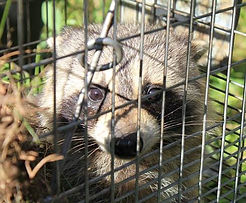Our research is generally of two types. First, we are interested in testing hypotheses in evolutionary and behavioural ecology, focussing on host/parasite interactions, sexual selection, and population/landscape genetics. In general, we use our long-term study of red squirrels in Algonquin Provincial Park for our research. Second, we are interested in using an evolutionary ecology framework to inform conservation science. To that end, we have worked with the Ontario Ministry of Natural Resources and Forestry, and the Toronto Zoo on various research projects. In general, our lab is highly collaborative, and we often have a number of colleagues involved in our work.
Host-parasite interactions and the costs of parasitism
We use our long-term studies of red squirrels, northern flying squirrels, and eastern chipmunks to test hypotheses related to the effects of parasites on host fitness. We also use DNA barcoding to identify flea species on these hosts, and, with Nadia Mykytczuk, have examined the microbiome of red squirrels and other species.
Sexual selection, sperm competition and sexual traits
We recently focused on the evolution of genitalia, especially the mammmalian baculum. We have applied allometric analyses and other approaches to assess the strength of sexual selection on both primary and secondary sexual traits. We continue to be interested in sperm competition and the evolution of ejaculate traits.
Population and conservation genetics of mammals
We have used population genetic approaches to understand patterns of gene flow among muskrat populations. We are also working with Jeff Bowman on population genetics of wild and domestic mink populations.



Evolutionary ecology of captive zoo populations
In collaboration with Gabriela Mastromonaco, the Toronto Zoo and other zoos, we are examining the effects of captivity on the evolution of endangered species, from effects on sperm morphometry to the causes and consequences of chronic stress in wild and captive populations.
Stress ecology and human activities
Sublethal responses to human activities such as logging and urbanization have consequences for fitness, and thus adaptation. We are interested in the effects of these activities on the stress response of wildlife, focussing on small mammal communities.
Wildlife zoonoses
The recent discovery of the bacterium Coxiella burnetii (the causative agent of Q-fever) in several species of rodents in Algonquin Park has lead to our work with Claire Jardine and Paula Menzies on understanding how this bacterium moves between the small ruminant farms that it normally is found in, to the natural environment.



